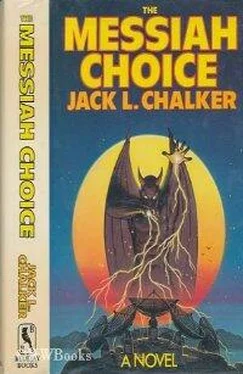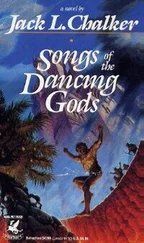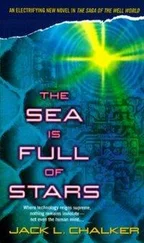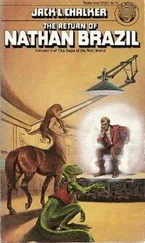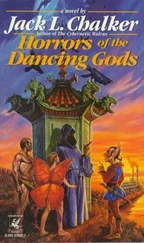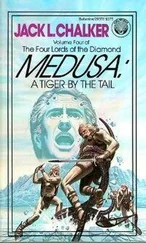Jack Chalker - The Messiah Choice
Здесь есть возможность читать онлайн «Jack Chalker - The Messiah Choice» весь текст электронной книги совершенно бесплатно (целиком полную версию без сокращений). В некоторых случаях можно слушать аудио, скачать через торрент в формате fb2 и присутствует краткое содержание. Год выпуска: 1985, ISBN: 1985, Издательство: Bluejay Books, Жанр: Фантастика и фэнтези, на английском языке. Описание произведения, (предисловие) а так же отзывы посетителей доступны на портале библиотеки ЛибКат.
- Название:The Messiah Choice
- Автор:
- Издательство:Bluejay Books
- Жанр:
- Год:1985
- ISBN:0-312-94301-6
- Рейтинг книги:4 / 5. Голосов: 1
-
Избранное:Добавить в избранное
- Отзывы:
-
Ваша оценка:
- 80
- 1
- 2
- 3
- 4
- 5
The Messiah Choice: краткое содержание, описание и аннотация
Предлагаем к чтению аннотацию, описание, краткое содержание или предисловие (зависит от того, что написал сам автор книги «The Messiah Choice»). Если вы не нашли необходимую информацию о книге — напишите в комментариях, мы постараемся отыскать её.
The Messiah Choice — читать онлайн бесплатно полную книгу (весь текст) целиком
Ниже представлен текст книги, разбитый по страницам. Система сохранения места последней прочитанной страницы, позволяет с удобством читать онлайн бесплатно книгу «The Messiah Choice», без необходимости каждый раз заново искать на чём Вы остановились. Поставьте закладку, и сможете в любой момент перейти на страницу, на которой закончили чтение.
Интервал:
Закладка:
They had almost literally taken apart and put back together her father’s old suite, then moved her into it while they remade her own. Her opinion of Greg had risen, rather than diminished as some in the Institute had hoped, during these times, heightened by a sense of mystery about just what he was doing. Staff people and even Sister Maria had gently pumped her, apparently also out of curiosity, but she could tell them very little. Convinced that he was constantly being monitored, he discussed almost nothing and used unknown means to get his information in and his reports out. It was not even clear, in fact, exactly to whom he was reporting.
Finally, though, she prevailed on him to take her down to the village, and he gave her the grand tour and some of the island’s history.
“Nobody really knows who discovered it, but the Spanish first chartered it, and the British took it from them. It didn’t really matter. Just one of the hundreds of little flyspeck islands north of Trinidad and Tobago.”
“No one lived here, then?”
“Nope. And a number of the islands you see from the mountaintop from here still have nobody on them, except maybe a lonely lighthouse keeper or something like that. The water’s in the wrong places, the thing is hell on agriculture, although with modern methods that cost more than they’re worth we’re able to grow some of the fresh fruit and vegetables up to the west of the Institute, and the lone harbor is shallow and narrow, with underwater rocks and reefs, and cost a fortune just to create the small channel that allows our twice weekly supply ship to come in at all. It just wasn’t worth any trouble.”
“Then—all of this is my father’s doing?”
“Not quite,” he told her. “The Royal Geographic Society kept a research station going near the summit off and on until the 1890s, mostly to keep some British presence here just in case somebody else wanted it. Then, in 1894, the government sold the entire island to Lord Carfax, one of those crusty rich eccentrics they used to have in those days. He built the place as a winter resort and getaway for his own use and the use of his friends. He’s the one who built the town in a miniature replica of a Tudor village. The staff was enormous, and was brought in from British holdings and Britain itself. Some of the families here are descended from those earliest servants and workers for the old Lord.”
“Then—it has been a resort all this time?”
“Oh, no. Not since World War II, really, but some of the people had been born and raised here and they stuck it out, pretty much forgotten in the backwaters of things. The old manor house, with its tennis courts and such, burned down in forty-two, I think, and its remains are mostly overgrown now.”
“But—what did the people do during all that time?”
“Fished, mostly. Applied for every British grant they could. Took the dole. They had housing, the Lord’s old water system, bounty from the sea and a little bit of land they farmed for their own consumption. Had a few cows and sheep. It wasn’t much—outdoor plumbing that worked half the time, no electricity, no conveniences, but the old timers maintain they were happy times, often likening the period to paradise. Britain tried to give it to Trinidad and Tobago or even Guyana in the sixties, and they successfully fought that, but finally the mother country just gave up and outright pulled out and gave them to the tiny nation they don’t like and don’t feel a part of. They look upon your father as something of a savior—saving the British from the savages, as it were. The price, though, was steep—they all became Magellan employees and workers at the Institute.”
They were, however, a friendly bunch in their own little town, far, it seemed to them, from the colossus looming high above them. They reminded Angelique very much of the small-town folk of the Gaspe in spite of their far different cultural origins. And these were the folk that made it all work; who unloaded the twice-weekly supply ships and got the food and other materials up the mountain to the Institute, who repaired and drove the carts, who did the cooking, picked up the trash, and threw out the garbage, buffed the floors of the Lodge and Institute buildings, and did all the rest of the routine things that made the Institute possible at all.
For Greg MacDonald, it had been a time of frustrations and changes. He found himself thinking of Angelique now only as a friend and companion and, without really being aware of it, he no longer even thought about the wheelchair and her disabilities. Not that he ignored them—that was impossible—but he now simply took them for granted. There was something about her own spirit, her own unwillingness to let her paralysis destroy her or even limit her more than it absolutely had to that he respected. He didn’t regard her as a nuisance or a hindrance, although he’d started out thinking that might be the case, and he actually found himself looking forward to her coming down, and missing her when she wasn’t around. He felt quite guilty that her total dependency seemed to turn him on, but if he didn’t know how idiotic it was he could almost swear he was falling in love with her.
He was frustrated, too, that he could tell her so very little of what he was up to and what he’d already pieced together. On Allenby, it wasn’t paranoia to believe that every single word you spoke was recorded in some security outpost.
They went down the beach, listening to the birds and the crash of the surf, he walking, she riding, he occasionally having to push to get her unstuck from the sand. Finally, they stopped, ironically not far from where her father had died, although within sight of the tiny church. It was late in the day, and they had spent the afternoon looking over merchandise sold by the crewmembers of the small supply steamer as a sideline. Most of it was probably stolen, but some if it was quality stuff and nobody on their route, including Allenby, was likely to have the authority to make arrests and make them stick.
“You look a little worried,” she noted.
“Huh? Sorry. Yeah, got to stop thinking so much.”
“Problems? Is the Institute bothering you again?”
“No,” he assured her, “that’s all been damped down, at least for now. It’s just that something was supposed to come in with the steamer today that I’ve been expecting for some time now and it just wasn’t there.”
“Something to do with your case?”
He nodded. “Yes. A crazy hunch, if you want to call it that, triggered by what Dobbs told you. Never mind for now. What about you? You’re looking more and more tired and drained. You nodded off on me a few times this afternoon. Maybe you should go back and get some rest.”
She shook her head. “I don’t know what is wrong with me. I am sleeping more and longer than I ever have, yet I feel very tired, as if I sleep very little.”
“The dreams again?”
“Yes, I suppose, but how can a dream tire you so?”
“Depends. The mind can do funny things. Have you talked to the doctor about it?”
“Oh, yes, many times. She gives me pills or portions, but they do no real good. She says that the dreams are a textbook set, for all the time I am whole and running free in the primeval woods. They are not bad dreams, just strange ones, but every time I go to sleep and have another I feel there is a wrongness to it, that the nightmare it is just around the corner. I am a bit frightened by it.”
He looked seriously at her. “Well, you’ve been through a lot lately. Still, I’m not sure this place is good for you. You should go to some south seas island, or at least Montreal, and just get away from anything having to do with Magellan or this place for a while.”
Читать дальшеИнтервал:
Закладка:
Похожие книги на «The Messiah Choice»
Представляем Вашему вниманию похожие книги на «The Messiah Choice» списком для выбора. Мы отобрали схожую по названию и смыслу литературу в надежде предоставить читателям больше вариантов отыскать новые, интересные, ещё непрочитанные произведения.
Обсуждение, отзывы о книге «The Messiah Choice» и просто собственные мнения читателей. Оставьте ваши комментарии, напишите, что Вы думаете о произведении, его смысле или главных героях. Укажите что конкретно понравилось, а что нет, и почему Вы так считаете.
